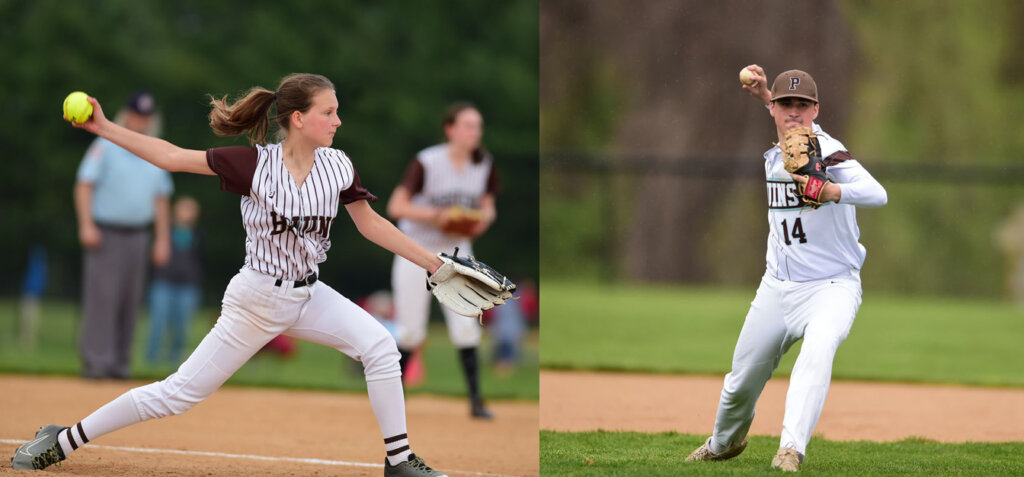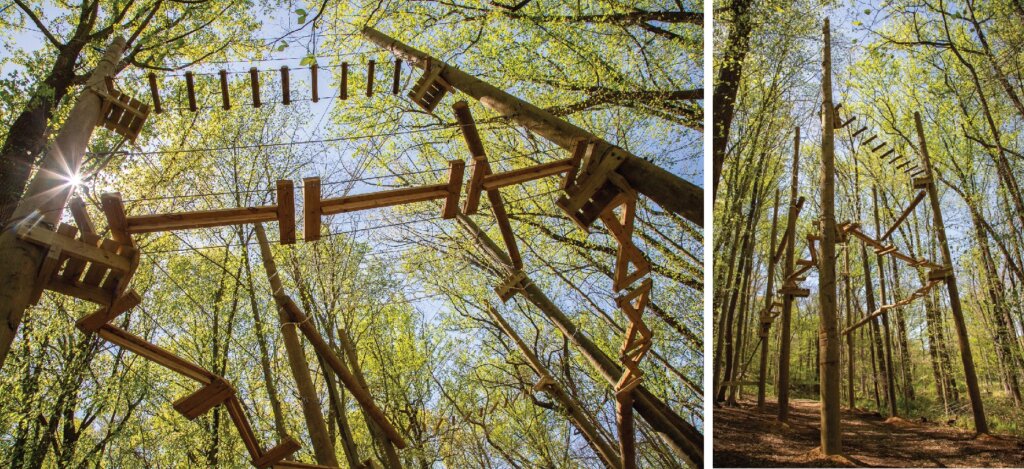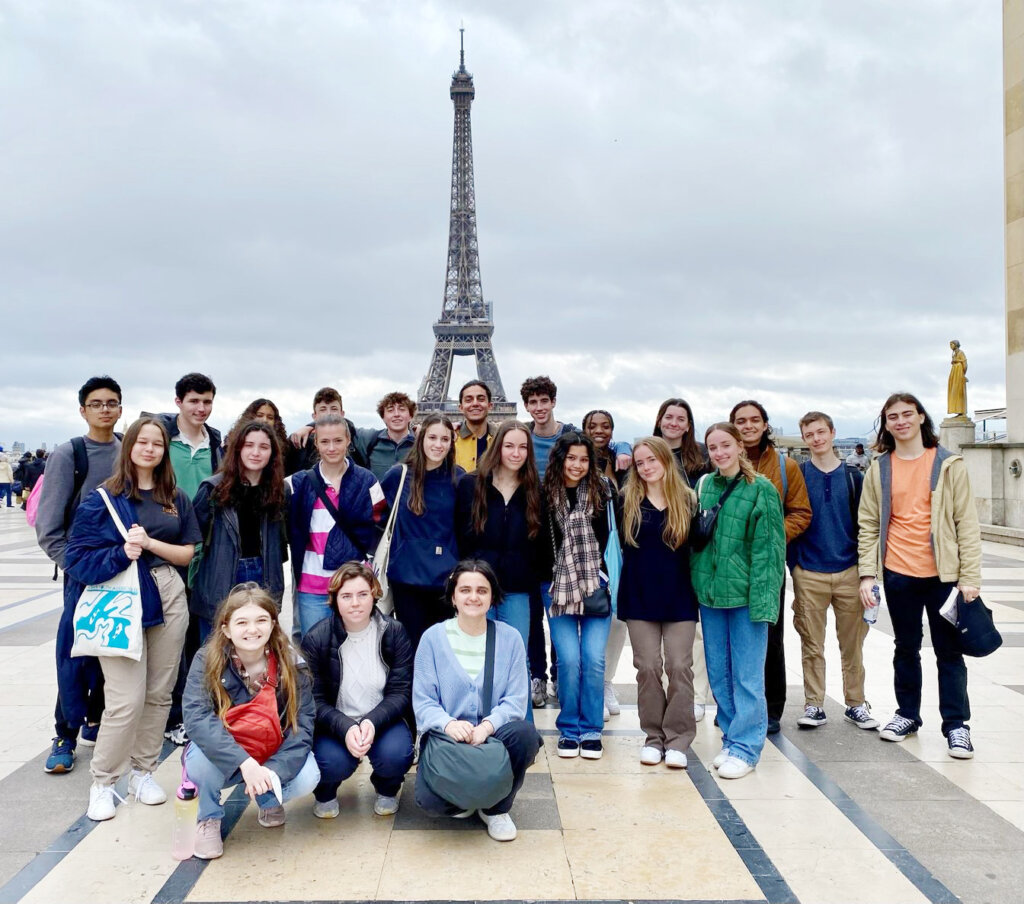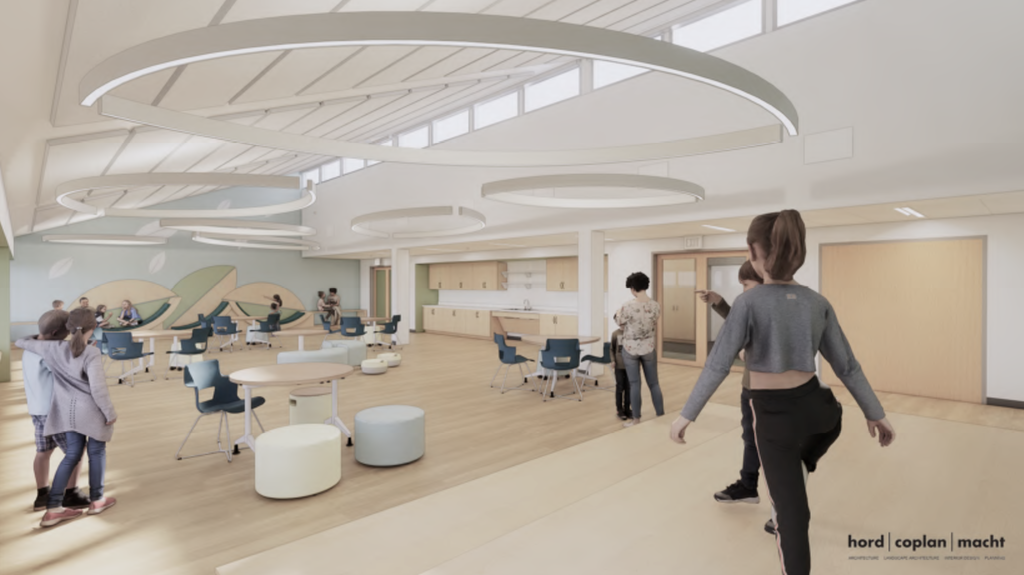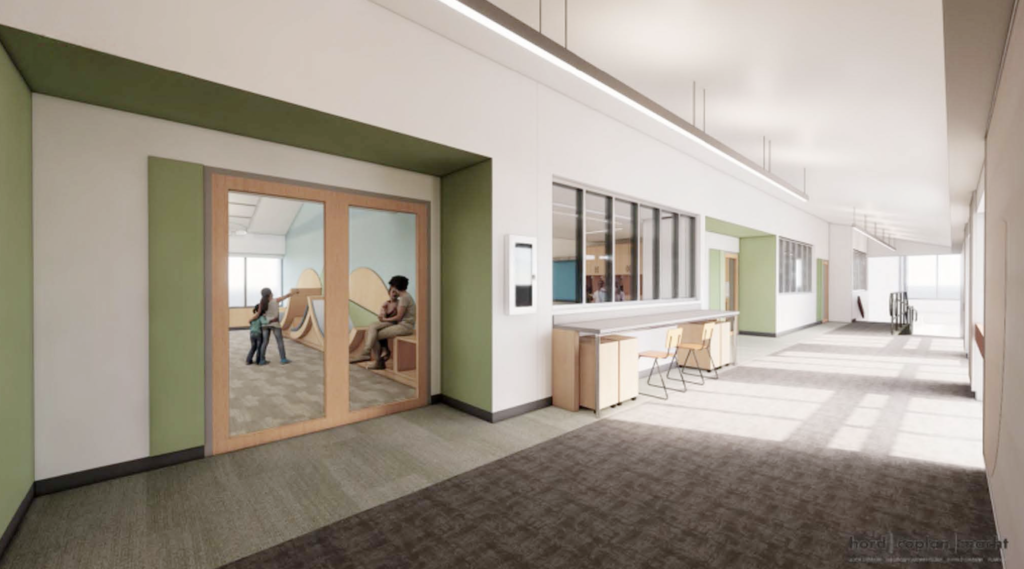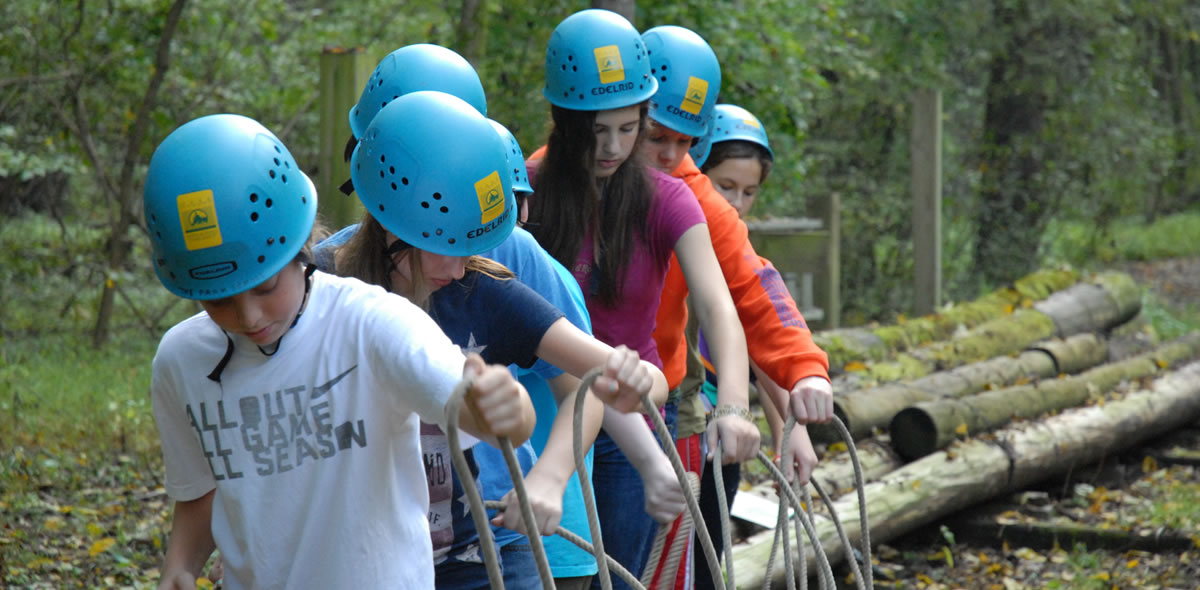Arts: Performing Arts
The Performing Arts program promotes a balance between process and performance.
There is an emphasis on student creativity, but all courses, whether production or process oriented, are designed to include careful attention to technique. The curriculum offers courses in acting, singing, recording, directing, set building, and performing. Opportunities for music performance include choral and instrumental ensembles. Productions typically include a musical on the main stage and a variety of theatrical pieces in the black box theater.
Requirements
- Students are required to complete four semesters in the arts, although most take more. Ninth graders select one arts course each semester from foundation electives in music, theater, and the visual arts. They may also join instrumental and choral ensembles, participate in theater productions in winter and spring, and take advanced classes.
- For 9th Graders, the ensemble performance courses do not take the place of the two-semester art requirement.
- Upperclassmen must complete their arts requirements prior to the second semester of their senior year. Independent studies are limited and are only available to students who have fulfilled their arts requirement and wish to pursue advanced level work in an area of special expertise
- All students should read course descriptions carefully to determine eligibility. Accelerated courses are so designated.
Parkapella
Grades 9-12 • Pre- or corequisites: An audition and permission of the department. All singers must participate as amember of either Parksingers, Park Strings, Wind Ensemble, or Park Jazz Collective. Parkappella, Park School’s auditioned Soprano, Alto, Tenor, and Bass a cappella vocal ensemble, sings a variety of styles of music, ranging from contemporary to classical. A focus of the group’s repertoire in the 2024-25 school year will be study and performance of contemporary songs in genres ranging from R & B, to jazz, to current pop hits.
The group is composed of two sections: EightNotes (soprano, alto) and Vocal Chords (tenor, bass). Members of both sections will rehearse separately and also together as part of the wider Parkappella group.
Students can enter the group with different levels of musical and vocal experience; all participants will leave with a strong sense of voice, a good ear, and an abiding love of song. Rehearsals take place twice a week during X block (see below), with additional practice times set up before major performances. While strong music reading skills are helpful, they are not a requirement: we are seeking singers whose musical taste and interests range from Alicia Keys, to Stevie Wonder, to the Beatles, Beethoven, and more!
• Students in Parkappella will also be members of either the EightNotes (Park’s soprano, alto a cappella group) or the Vocal Chords (Park’s tenor, bass a cappella group).
• Rehearsals: The rehearsals for Park’s a cappella groups: one rehearsal per week for Parkappella (combined soprano, alto, tenor, bass), one rehearsal per week for either EightNotes or Vocal Chords sections.
• As part of the class, students will be required to submit at least one a cappella arrangement of a song of their choice.
Parksingers
Grades: 9-12
Parksingers, a gender inclusive, non-auditioned, joyful, and versatile chorus, learns and performs a variety of traditional and contemporary choral music. The group rehearses three times a week and performs in assemblies for each division, evening concerts at Park, and community and sporting events. Students are encouraged to complete one music elective during their first three semesters in Parksingers.
Park Jazz Collective
Grades: 9-12 • Pre- or corequisites: Ongoing instrumental lessons and an audition.
Park’s Jazz Collective (PJC) is open to instrumentalists who are familiar with chord symbols and progressions, improvisation, and are interested in learning jazz styles and ensemble playing. PJC musicians work towards gaining and improving their improvisation skills and learning the language of jazz theory. Selections are from the jazz canon, world music, fusion, traditional, and contemporary styles. PJC represents jazz at Park in assemblies, bi-annual concerts, and public and community events including International Jazz Day. The group meets twice a week after school and aims for “playing in the pocket.”
Park Strings
Grades 9-12 • Pre- or corequisites: Instrumental lessons and permission of the department.
Park Strings explores a variety of classic and contemporary string orchestra and chamber music repertoire. Students expand their interpretive and technical skills, learn alternative styles, and develop ensemble skills through coaching and rehearsals three times a week. The group performs two concerts a year, as well as at numerous assemblies and the Goldsoundz concert series.
Theater Tech Crew Leadership
Grades 10-12 • Prerequisite: Students must work on the tech crew for one Upper School show before becoming eligible for Tech Crew Leadership credit.
This course is designed to give each student the opportunity to develop their leadership potential in the field of technical theater, including lighting design; sound design; set design/construction; props design/construction; scenic art/painting techniques; and stage crew. Students are given opportunities to apply and grow their knowledge by providing technical assistance for Park theatrical productions, assemblies, and events. The course will meet once a week during lunch, and a commitment to after school hours as part of the team for at least one of Park’s major productions is also a requirement. Students not in the class are still encouraged and welcome to attend work sessions and contribute their time and talent in a variety of ways!
Wind Ensemble
Grades 9-12 • Pre- or corequisite: Instrumental lessons and permission of the department.
Wind Ensemble is comprised of all brass, woodwinds, percussion, string bass, and electric bass with opportunities for multi-instrumentalists on drum kit, piano, and guitar. The group plays a variety of styles from “classical” to contemporary. As instrumentalists, the class focuses on ensemble skills, technical skills, rhythmic accuracy, intonation, style, tone, blend, and some music theory. The group performs at least two major concerts a year.
Performing Arts
Acting
Grades 9-12 • This course may be repeated with permission of the instructor.
Do you like to make others laugh? Do you like to tell enthralling stories? In Acting, students tell stories by living them. This introductory course will focus on basic acting techniques that professionals use in plays, movies, TV shows, and musicals. Through exercises and scene-work, students learn the fundamentals of playing truthfully within imaginary circumstances, to develop characters, create circumstances, analyze scenes for actions, play off of their partners, and personalize work by tapping into their own lives. They present a final scene to a live audience of friends at the end of the semester.
Beatz: Electronic Production
Grades: 9-12
Students learn to produce Hip Hop beats, soundtracks, dance, or other electronic music using a variety of software, including Ableton Live and Logic. The class focuses on MIDI and controller programming, drum machine sequencing, sampling, loop creation, synthesizer and production tricks, vocal processing, and basic musical harmony and form in the keyboard lab and the recording studio.
Comedy
Grades 9-12 • This course may be repeated with permission of the instructor.
Whether you’re the class clown or severely judgmental of the class clown, you have to admit, humor is part of what
makes life, well… life. And believe it or not, there are “laws” to comedy! In this improvisation-based acting course, students will study famous comedians and cartoons, practice trips, falls, slaps, and other physical gags, and gush about things they love and loathe in weekly “harangues.” Different solo and group pieces developed by students during the course will be selected for a final performance at the end of the semester. No previous experience necessary.
Dance/Theater Performance and Production
Grades: 9-12
Calling dancers and anyone interested in dance/theater production and performance! This course will explore and consider elements that go into the creation, rehearsal, and production of dance and dance/theater performance. Beginning with consideration of a variety of dance and movement styles, genres, and vocabularies, students will explore various ways the human body relies on movement to experience and relate to the world. Consideration of different dance forms and the body’s unique capacity to express will lead the class to experiment with approaches to the organization and creation of original choreography and dance/theater material. Students will also consider narrative and compositional techniques before turning their attention to the creation of audio for performance works. Study of the visual and sculptural aspects of dance will lead the class to create scenic and prop elements, costumes, and lighting. The semester will culminate in a performance of work choreographed and produced by students on subjects they choose. No previous dance experience is necessary.
Fall Production: Chicago
Grades 10-12 • Prerequisite: An audition and an entry-level class in acting or music or permission of the department.
This course is devoted to producing a full-scale musical. Students will read, analyze, and rehearse a musical to be performed in November. Actors will develop their characters, circumstances, and actions for the production while learning the music and further expanding their vocal technique. By participating in the production process, students will learn the standard practices of theater, learn to work as an ensemble, and challenge themselves with the demands of performance. This course will have after school and Saturday rehearsals.
Introduction to Music Theory
Grades 9-12
Are you a musician who plays mainly by ear but can’t read music? Maybe you can read in treble clef, but have no idea
what an alto clef is? Or maybe you don’t even play an instrument but have always wanted to learn how to read music?
This class will focus on basic music theory, from learning how to read music notation in the different clefs to the study of
the major and minor scales. Although intended as a stand-alone class, students who take this course will be better
prepared for the Music Theory (Accelerated) course offered next year.
Keyboards
Grades: 9-12
This course gives students a chance to learn and play those keyboard riffs that everyone recognizes. Students will develop the skills to get past those few riffs and move toward being a player with chops. Core components of this class will be understanding and performing from the rock, pop, R&B, gospel, folk, and jazz canons. Learn music from Beethoven to Bruno Mars. After an introduction to basic keyboard theory, students will learn to incorporate harmonies, bass lines, and improvisation techniques and develop their own accompaniments and grooves. Using the keyboard lab gives students access to unleashing the full capabilities of the digital audio workstation, synthesizer, mixing, and sequencing software. No previous keyboard experience is necessary, and the class is also open to students with previous experience, as the class will be geared to a range of levels.
Modern Music Band
Grades: 9-12
In this class, students will play and record modern (pop/rock/R&B) music. They will learn many aspects of what goes into creating great song arrangements and putting on an awesome show. Learning arrangements of songs suggested by the class, students will also have the opportunity to bring in original material to workshop with the group. They will also analyze the styles of different bands from the past and present to find out what elements make their songs work so well. Students will choose a main instrument to focus on and will also spend time working on their theoretical knowledge of their music through analysis and critique. Performances are planned for Goldsoundz in October and December. This class is open to anyone interested in developing their musical skills and knowledge — instruments include piano, guitar, bass, drums, vocals, sax, trumpet, trombone, clarinet, flute, violin, viola, and cello.
Playing and Writing about Music
Grades 11-12 • 10 with permission of the English Department. This course may be taken for either an Arts or an English credit.
In this course, students will both play and write about music. Beginners will learn the basics of guitar chords and strumming; advanced players may choose to use their own instruments as the class explores musicality through a broad range of modern musical styles and periods. As students write about their own connections to music, they will be in the company of journalists like Lester Bangs, Joan Didion, Jessica Hopper, and Ben Fong-Torres, as well as novelists like Ralph Ellison and Ondaatje, who try to understand what music is and does through fiction. Examining music from Robert Johnson to Bob Dylan to Nas, the class will explore the connections between form and ethnicity, experiment with ways of describing tone, form, and lyrical ideas, and also learn how to incorporate them into students’ own musicality and writing. Assignments will include an annotated playlist, a musical autobiography, a concert review, an homage to a great work, a character study of a musician or scene, and a critical appreciation of an album.
Script writing and Directing
Grades 10-12
This class is your chance to bring your stories to life! In this collaborative course, students will learn how to produce original works for performance. They will familiarize themselves with dramatic structure, workshop short scripts and scenes, and dip into directing and acting as they test out their ideas with each other. By the end of the class, the goal is to have created a short script that will be shared with an audience. Students who want to direct (or write!) Student Directed Plays must take this class to be eligible. No previous theater or film experience is necessary.
Stagecraft
Grades: 9-12
This is a hands-on class where students will learn the art and skill of creating a theater production. Focusing on the different members of the production team and how they work together to bring a show from concept to production, the class will work first on the Upper School Musical, and then on the 8th Grade play. For each show, students will begin by reading and analyzing the script. Then, they will design, build, and paint the set. Finally, they will work on the lighting and sound. While there is no homework, this class requires a commitment outside of class, as students are expected to work on the production team for the musical.
A Place for Us: Musical Theater as Refuge
Grades 10-12 • This course may be taken for either an Arts or an English credit.
This class will trace the birth and development of that uniquely American art form: the Broadway musical. Students will
listen to songs, watch productions, and even do a little singing! Throughout, they will consider how the changing shape of
the musical reflects the identities and experiences of the people who created it – people often considered “outsiders” due
to race, ethnicity, religion, gender, and sexuality. The class will examine how composers, writers, and performers critiqued,
reworked, and affirmed American mythology through these shows. Students will be asked to write reflectively and
analytically about the musical, and there will be a culminating creative project. Shows to explore may include: Showboat,
Kiss Me Kate, Oklahoma!, West Side Story, Cabaret, Parade, Ragtime, Company, Les Miserables, and In the Heights.
Acting
Grades 9-12 • This course may be repeated with permission of the instructor.
Do you like to make others laugh? Do you like to tell enthralling stories? In Acting, students tell stories by living them. This
introductory course will focus on basic acting techniques that professionals use in plays, movies, TV shows, and musicals.
Through exercises and scene-work, students learn the fundamentals of playing truthfully within imaginary circumstances,
to develop characters, create circumstances, analyze scenes for actions, play off of their partners, and personalize work
by tapping into their own lives. They present a final scene to a live audience of friends at the end of the semester.
Global Music and Culture
Grades: 9-12
Are you curious about what music sounds like from around the world? Do you want to know more about how music in its many forms has developed? Through this class, students will spark their musical curiosity and explore the different aspects of musical expression and cultural traditions across the globe. They will learn how to recognize, analyze, and discuss the different aspects of music through the lens of the many cultures.
Home Studio Production
Grades: 9–12
Professional level music and multimedia production has never been easier to accomplish at home. This course will focus
on music production, audio engineering, and content creation specifically for a laptop. Students will record, compose, arrange, mix, and master band sessions and original compositions, learn the basics of producing commercials and short videos, live streaming and virtual event production, and content creation for YouTube and other digital platforms.
Improvisation for Instrumentalists
Grades: 9-12
In this class, instrumentalists will work to develop their voices as improvisers. By studying the musical vocabulary used by
jazz, blues, rock, and country soloists, and their use of pentatonic scales, major and minor modes, arpeggios, and chromaticism, students will focus on bringing their techniques into their playing. Additionally, the class will explore the fundamentals of contemporary music theory in order to better understand how to “play through the changes.” Players will become acquainted with improv approaches on different instruments, work with different sized groups, and learn to develop their own background lines, and walking bass lines.
Keyboards
Grades 9-12
This course gives students a chance to learn and play those keyboard riffs that everyone recognizes. Students will
develop the skills to get past those few riffs and move toward being a player with chops. Core components of this class
will be understanding and performing from the rock, pop, R&B, gospel, folk, and jazz canons. Learn music from Beethoven
to Bruno Mars. After an introduction to basic keyboard theory, students will learn to incorporate harmonies, bass lines,
and improvisation techniques and develop their own accompaniments and grooves. Using the keyboard lab gives students access to unleashing the full capabilities of the digital audio workstation, synthesizer, mixing, and sequencing software. No previous keyboard experience is necessary, and the class is also open to students with previous experience, as the class will be geared to a range of levels.
Ninth/Tenth Production – Clue
Grades 9-10 • Prerequisites: An entry-level acting class and an audition.
In this course, 9th and 10th Graders will read, analyze, and rehearse a play. Careful analysis of the play will provide a
foundation for students to develop their characters, circumstances, and actions for the production. Students will explore
the world of the play, its cultural contexts, and its particular theatrical style and, by doing so, will expand their own
aesthetic awareness. By participating in the production process, students will learn the standard practices of theater,
learn to work as an ensemble, and challenge themselves with the demands of performance. This course will have after-
school rehearsals. The production will be in mid-May.
Rhythm Section Workshop
Grades 9-12
This class will include listening to, analyzing, and practicing music on guitar, bass, keyboards, percussion, and drums; but, it is open to all instrumentalists and vocalists. Emphasis will be on familiarizing students with rhythmic cells in various time
signatures and strengthening reading/rhythmic feel. Some examples of music to be covered: Afro-Caribbean dance music, West African drumming, Brazilian Samba/Bossa Nova, Jazz, and Rock. Students will also be able to compose and improvise with rhythmic and melodic ideas in groups, playing activities on various instruments.
Spring Production – A Flea in Her Ear
Grades 11-12 • Prerequisite: Audition. After-school rehearsals are a part of this course, and students cast as leads will not be able to participate in other after-school activities.
This course will be devoted to producing a main stage production. Students will read, analyze, and rehearse the play. Careful analysis will provide a foundation for students to develop their characters, circumstances, and actions for the production. Students will explore the world of the play and its cultural contexts, expanding their aesthetic awareness. By participating in the production process, students learn the standard practices of theater, learn to work as an ensemble, and challenge themselves with the demands of performing a full-length play. Spring Production is by audition; students are recommended to have been in a theater production or class before enrolling.
Stagecraft
Grades 9-12
This is a hands-on class where students will learn the art and skill of creating a theater production. Focusing on the different members of the production team and how they work together to bring a show from concept to production, the class will work first on the Upper School Musical, and then on the 8th Grade play. For each show, students will begin by reading and analyzing the script. Then, they will design, build, and paint the set. Finally, they will work on the lighting and sound. While there is no homework, this class requires a commitment outside of class, as students are expected to work on the production team for the musical.
